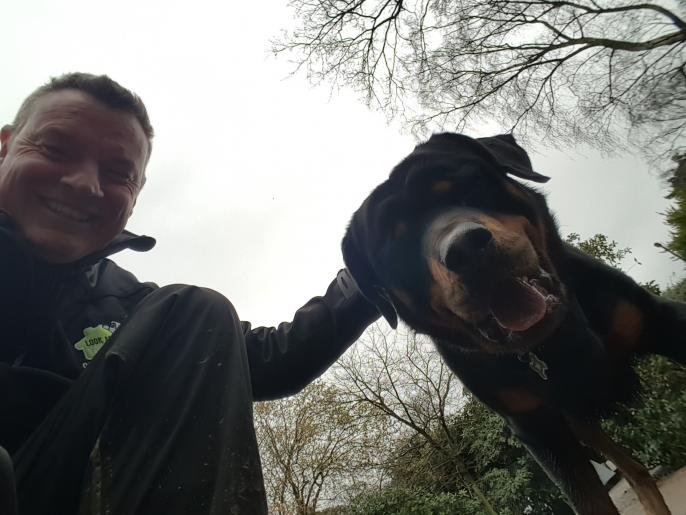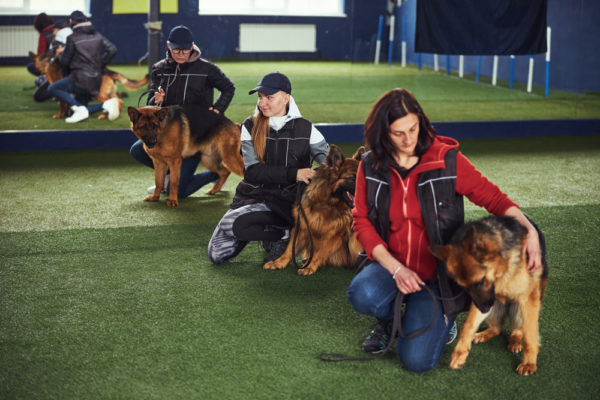Dog Training Myths Busted: What Really Works for Your Pet
Dog Training Myths Busted: What Really Works for Your Pet
Blog Article
The Ultimate Overview to Pet Dog Training: Change Your Pet dog's Habits
Effective pet dog training is essential for promoting a harmonious connection in between pet dogs and their owners. This overview not only intends to outfit you with the necessary devices to change your dog's habits however also invites you to explore just how these foundational principles can lead to a much deeper connection with your family pet.
Understanding Pet Habits
Recognizing pet actions is important for efficient training and a harmonious partnership between canines and their owners. A pet's habits is affected by a combination of genes, environment, and experiences. Dog training. Identifying these aspects permits proprietors to tailor their training approaches to satisfy the individual requirements of their pets
Canines connect mainly with body language, vocalizations, and faces. A wagging tail can show excitement or happiness, while a put tail might signal fear or entry. Observing these hints allows proprietors to react properly, enhancing favorable behaviors and attending to unfavorable ones effectively.
Additionally, recognizing the social framework of pet dogs can give understandings into their habits. Dogs are pack pets, and they flourish in an organized atmosphere. Establishing clear boundaries and constant regulations can avoid complication and advertise a complacency.
Furthermore, acknowledging the all-natural reactions of pet dogs, such as need to go after or dig, is vital. These instincts can be redirected via ideal electrical outlets, such as play or workout. By adequately understanding these behavioral facets, owners can promote a favorable training experience, ultimately leading to a obedient and well-adjusted canine companion.
Necessary Training Strategies
Reliable dog training relies on a variety of vital methods that can substantially improve the knowing process for both the proprietor and the dog. One basic technique is favorable reinforcement, which includes satisfying preferable actions with treats, appreciation, or play. This approach motivates pet dogs to duplicate the actions that result in positive results, promoting a relying on partnership in between the pet dog and proprietor.
One more secret technique is uniformity in expectations and commands. Making use of the exact same spoken cues and hand signals aids the pet dog understand what is required, decreasing complication and promoting quicker learning. Furthermore, establishing clear borders and policies is important for effective interaction.
Socialization is likewise a vital element of training. Subjecting pet dogs to different atmospheres, individuals, and other pets assists them establish suitable social skills and reduces stress and anxiety in strange situations.
Finally, patience and timing are crucial. Training sessions must be short but regular, guaranteeing that the pet continues to be involved and receptive. By employing these crucial techniques, owners can create a structured and favorable training experience that promotes great actions and enhances the bond with their canine friends.
Developing a Training Schedule
Just how can a well-structured training routine improve a pet's learning experience? A training timetable gives uniformity, guaranteeing that pet dogs obtain routine, concentrated direction. This predictability helps pets understand what is expected of them, reinforcing their learning and permitting better retention of commands and actions.
When developing a training timetable, it is vital to take into you can check here consideration the dog's age, type, and specific personality. Young pups might benefit from much shorter, much more regular sessions, while grown-up pets might flourish with longer, less frequent training durations. Integrating a variety of activities can additionally maintain the sessions involving, preventing monotony and promoting excitement for knowing.
Additionally, organizing training sessions at details times of the day can help solidify a regimen. For instance, combining training with day-to-day look at this now strolls or play can create a positive organization with learning. It is also crucial to consist of time for support, such as deals with or appreciation, to award wanted actions without delay.
Last but not least, flexibility is essential. While consistency is vital, being versatile to the pet's state of mind or power degree can boost their understanding experience. A well-crafted training schedule eventually lays the foundation for reliable communication and a stronger bond in between the dog and owner.
Typical Educating Obstacles
Regardless of having a well-structured training routine, canine owners frequently experience various obstacles throughout the training procedure. One common concern is disparity in hints and commands. When several relative utilize various terms or tones, a pet dog may become baffled, preventing its capacity to find out efficiently.
One more constant difficulty is diversion. Dog training. Dogs are naturally interested creatures, and external stimulations such as other animals, noises, or people can divert their attention throughout training sessions. This needs proprietors to develop a controlled setting or gradually introduce interruptions to strengthen emphasis
In addition, varying power levels can affect training outcomes. High-energy pets might battle to calm down and concentrate, while more laid-back breeds could need added motivation to involve. Tailoring the training approach to fit the individual pet dog's temperament is important for success.

Building a Strong Bond
A strong bond in between a pet dog and its owner is essential for effective training and total well-being. Dog training. This connection cultivates trust fund, which is important for effective interaction during the training process. When a pet dog really feels safe and secure and connected to its owner, it is most likely to respond favorably to commands and hints
To develop this bond, consistency is vital. Developing a regimen that consists of normal feeding, exercise, and training sessions aids create a sense of security. Furthermore, positive reinforcement methods, such as deals with, appreciation, and play, reinforce wanted behaviors while enhancing the psychological link.
Socializing is another crucial aspect of bond-building. Revealing your pet to different settings, people, and other pets helps them really feel extra comfy and certain, boosting the bond with their proprietor. Taking part in tasks together, such as walking, playing fetch, or taking part in obedience training, advertises teamwork and common enjoyment.
Conclusion

Understanding canine behavior is vital for reliable training and a harmonious partnership between pet dogs and their owners.Reliable pet dog training depends on a range of important methods that can significantly improve the discovering procedure for both the canine and the proprietor.In spite of having a well-structured training routine, pet dog proprietors often come across numerous obstacles during the training process.In final thought, efficient pet dog training counts on a comprehensive understanding of canine behavior, the application of vital methods, and the facility of an organized training timetable. By stressing favorable support and uniformity, pet proprietors can significantly enhance their pets' behavior, eventually making sure an unified connection and advertising the wellness of both the pet dog and its atmosphere.
Report this page